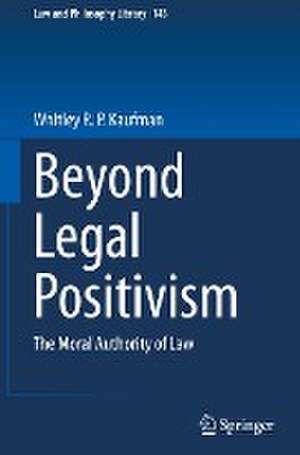Beyond Legal Positivism: The Moral Authority of Law: Law and Philosophy Library, cartea 143
Autor Whitley R. P. Kaufmanen Limba Engleză Hardback – 29 oct 2023
Din seria Law and Philosophy Library
- 20%
 Preț: 813.11 lei
Preț: 813.11 lei - 20%
 Preț: 569.00 lei
Preț: 569.00 lei - 18%
 Preț: 1225.16 lei
Preț: 1225.16 lei - 18%
 Preț: 950.66 lei
Preț: 950.66 lei - 15%
 Preț: 583.43 lei
Preț: 583.43 lei - 15%
 Preț: 639.25 lei
Preț: 639.25 lei - 15%
 Preț: 641.53 lei
Preț: 641.53 lei - 18%
 Preț: 893.84 lei
Preț: 893.84 lei - 24%
 Preț: 797.39 lei
Preț: 797.39 lei - 15%
 Preț: 579.84 lei
Preț: 579.84 lei - 15%
 Preț: 644.95 lei
Preț: 644.95 lei - 18%
 Preț: 895.76 lei
Preț: 895.76 lei - 15%
 Preț: 644.95 lei
Preț: 644.95 lei - 20%
 Preț: 571.85 lei
Preț: 571.85 lei - 15%
 Preț: 642.03 lei
Preț: 642.03 lei - 18%
 Preț: 1232.26 lei
Preț: 1232.26 lei - 18%
 Preț: 1116.05 lei
Preț: 1116.05 lei - 15%
 Preț: 655.92 lei
Preț: 655.92 lei - 18%
 Preț: 833.54 lei
Preț: 833.54 lei - 18%
 Preț: 898.26 lei
Preț: 898.26 lei - 18%
 Preț: 1016.63 lei
Preț: 1016.63 lei -
 Preț: 390.25 lei
Preț: 390.25 lei - 24%
 Preț: 700.89 lei
Preț: 700.89 lei - 18%
 Preț: 999.60 lei
Preț: 999.60 lei - 18%
 Preț: 1115.77 lei
Preț: 1115.77 lei - 18%
 Preț: 1107.88 lei
Preț: 1107.88 lei - 15%
 Preț: 637.46 lei
Preț: 637.46 lei - 18%
 Preț: 781.94 lei
Preț: 781.94 lei - 24%
 Preț: 815.54 lei
Preț: 815.54 lei - 18%
 Preț: 786.18 lei
Preț: 786.18 lei - 18%
 Preț: 735.21 lei
Preț: 735.21 lei - 15%
 Preț: 653.33 lei
Preț: 653.33 lei - 18%
 Preț: 782.10 lei
Preț: 782.10 lei
Preț: 888.97 lei
Preț vechi: 1084.11 lei
-18% Nou
Puncte Express: 1333
Preț estimativ în valută:
170.12€ • 184.73$ • 142.90£
170.12€ • 184.73$ • 142.90£
Carte tipărită la comandă
Livrare economică 22 aprilie-06 mai
Preluare comenzi: 021 569.72.76
Specificații
ISBN-13: 9783031438677
ISBN-10: 3031438671
Ilustrații: VI, 161 p.
Dimensiuni: 155 x 235 mm
Greutate: 0.39 kg
Ediția:1st ed. 2023
Editura: Springer International Publishing
Colecția Springer
Seria Law and Philosophy Library
Locul publicării:Cham, Switzerland
ISBN-10: 3031438671
Ilustrații: VI, 161 p.
Dimensiuni: 155 x 235 mm
Greutate: 0.39 kg
Ediția:1st ed. 2023
Editura: Springer International Publishing
Colecția Springer
Seria Law and Philosophy Library
Locul publicării:Cham, Switzerland
Cuprins
1. Introduction.- 2. Conceptual Analysis.- 3. The Problem of Legal Authority.- 4. The Function of Law.- 5. Normative Legal Positivism.- 6. Conclusion.
Notă biografică
Whitley Kaufman has a degree in law from Harvard University and a degree in philosophy from Georgetown University. He has been teaching classes in the philosophy of law for over twenty years. He has published four previous books and over thirty articles, on topics including legal philosophy, moral philosophy, philosophy of religion, and philosophy of literature. He also has an interest in the philosophy of comedy and humor; his last book was an analysis of the humor of the Seinfeld television series.
Textul de pe ultima copertă
Legal Positivism has been the dominant school of legal philosophy for much of the last century, despite its many critics. Its central tenet has long been that there is no necessary connection between law and morality. This book provides a broad but clear and jargon-free account of the central objections to the theory and why those objections are sufficient to show that legal positivism is no longer tenable. This includes a broad critique of the purported distinction method of legal positivism, the idea of ‘conceptual analysis,’ as well as a detailed assessment of the most influential of all legal positivist theories, that of H.L.A. Hart. The book also provides a defense of the natural law school, which holds in contrast to legal positivism that the authority of law arises from its intrinsic connection to morality. The author demonstrates that most of the criticism of the natural law school arises from a caricatured account of that doctrine, for instance the idea that it requires substantive theological commitments or particular conceptions of human nature. In contrast, the author presents an account of natural law theory that is grounded in a commitment to moral truth, but not to any theological beliefs. The nature of law can only be understood in terms of its moral function, to provide a clear set of moral rules that are required for a society to function effectively.
Caracteristici
Defends a minimal, non-theological version of natural law theory Addresses both classical and contemporary legal positivism Written in a manner accessible to the non-specialist, while still addressing all the key issues in detail
